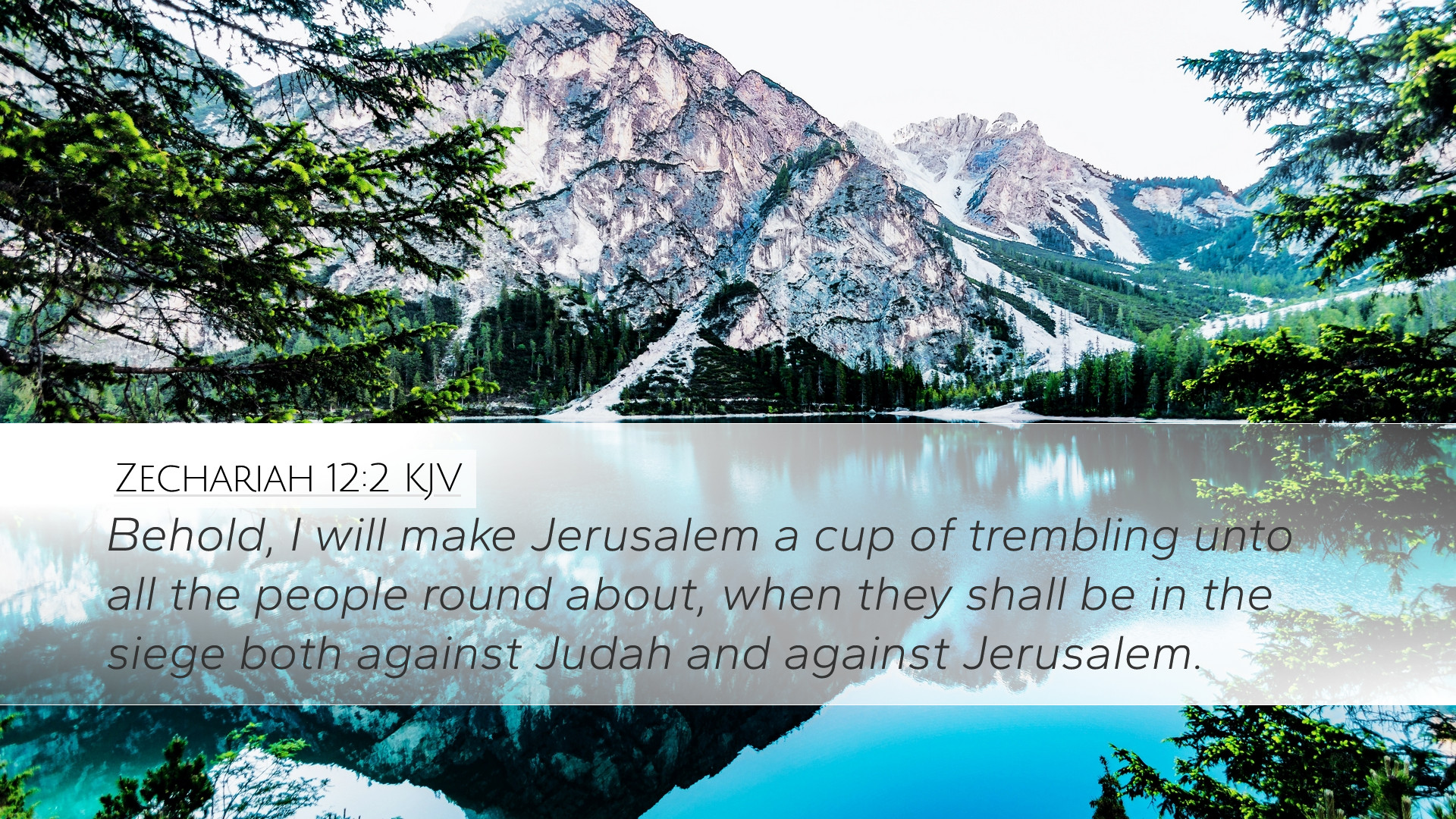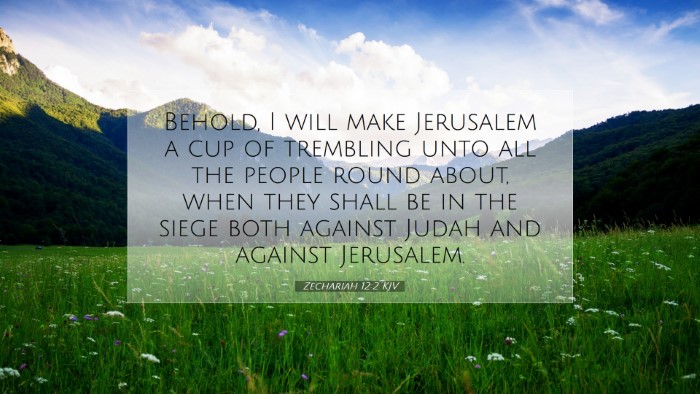Old Testament
Genesis Exodus Leviticus Numbers Deuteronomy Joshua Judges Ruth 1 Samuel 2 Samuel 1 Kings 2 Kings 1 Chronicles 2 Chronicles Ezra Nehemiah Esther Job Psalms Proverbs Ecclesiastes Song of Solomon Isaiah Jeremiah Lamentations Ezekiel Daniel Hosea Joel Amos Obadiah Jonah Micah Nahum Habakkuk Zephaniah Haggai Zechariah MalachiZechariah 12:2
Zechariah 12:2 KJV
Behold, I will make Jerusalem a cup of trembling unto all the people round about, when they shall be in the siege both against Judah and against Jerusalem.
Zechariah 12:2 Bible Commentary
Commentary on Zechariah 12:2
Zechariah 12:2 states, "Behold, I will make Jerusalem a cup of trembling unto all the people round about, when they shall be in the siege both against Judah and against Jerusalem."
Introduction
The prophetic utterances of Zechariah, especially this verse, encapsulate the ongoing themes of divine judgment, restoration, and the centrality of Jerusalem in God's redemptive plan. This commentary draws insights from renowned public domain scholars such as Matthew Henry, Albert Barnes, and Adam Clarke to provide a thorough exploration of this critical biblical text.
Contextual Analysis
This verse is situated within the larger framework of Zechariah's prophecies that address both the immediate post-exilic community and eschatological themes pertaining to the end times. The prophecy of Zechariah, being addressed to a people who experienced deep national trauma during the Babylonian Exile, reflects God's commitment to restore both the city of Jerusalem and its people.
Matthew Henry's Insights
Matthew Henry emphasizes the symbolic significance of Jerusalem as a “cup of trembling.” He indicates that this metaphor illustrates Jerusalem's role as a source of distress and fear for surrounding nations. The 'cup' signifies the overflowing judgments that would come upon those who oppose God's plan for His people. Henry notes:
- Divine Sovereignty: God’s control over all nations is highlighted. Those who attempt to besiege Jerusalem are shown to be ultimately subject to divine rebuke.
- Fate of Nations: The verse serves as a prophetic reminder that God will not only identify with His people but will also confront their enemies.
Albert Barnes’ Observations
Albert Barnes provides a complementary perspective by focusing on the geopolitical implications of the prophecy. He states that the 'cup of trembling' symbolizes impending judgment not just for Jerusalem but for all nations involved in conflict with it. Key points in Barnes’ commentary include:
- Historical Context: Jerusalem's history of conflict makes it an object lesson in divine justice. Barnes notes that throughout history, nations that waged war against Jerusalem often faced dire consequences.
- Theological Implications: Barnes stresses the notion of God's protective hand over His people, suggesting that no matter the external threats, God's purpose for Jerusalem prevails.
Adam Clarke’s Commentary
Adam Clarke expands on the prophetic nature of the text, outlining the spiritual significance of Jerusalem as the epicenter of God's plan for humanity. Clarke emphasizes:
- Spiritual Warfare: The 'cup' is indicative of God's judgment, which leads to spiritual turmoil for those nations that impose suffering on His people.
- Messianic Foreshadowing: Clarke sees the prophecy as a foreshadowing of the greater conflict surrounding Christ and the establishment of the New Covenant through His sacrifice.
Thematic Exploration
The central themes emerging from Zechariah 12:2 involve divine judgment, the significance of Jerusalem, and the eschatological expectations that accompany the Messianic age.
Divine Judgment
The concept of a ‘cup of trembling’ is a metaphor rooted in scripture that conveys the reality of God’s wrath upon the nations. As elucidated by Henry, God’s hand directs history, and no nation can stand in opposition without facing consequences. This serves as a forewarning to all nations, illuminating God's unwavering justice.
The Centrality of Jerusalem
Scholars consistently argue for Jerusalem's importance as the focal point of God's plans. As Barnes elaborates, the city is not merely a physical location but a spiritual representation of God's promises to Israel. The siege mentioned in Zechariah signifies the opposition faced by the faithful, encouraging believers to trust in God’s deliverance.
Eschatological Implications
The prophecy also points towards future events in God’s redemptive narrative. Clarke’s identification of Messianic foreshadowing opens discussions on the ultimate conflict between good and evil, where the protection of God over Jerusalem prefigures the coming of Christ and the establishment of His kingdom.
Pastoral Application
For pastors today, Zechariah 12:2 serves as a reminder of God’s presence amid trials. The imagery of the ‘cup of trembling’ can be paralleled to the struggles of believers facing various forms of opposition. Pastors may draw their congregations’ attention to the assurances of God’s protection and justice. Furthermore, this verse serves as a call to intercede for Jerusalem and all nations, acknowledging God’s sovereignty in historical and current events.
Conclusion
Zechariah 12:2 encapsulates critical aspects of divine providence, judgment, and the theological significance of Jerusalem within God's plans. Through the insights provided by Henry, Barnes, and Clarke, both students of the Bible and seasoned theologians can gain deeper appreciation for the complexities within prophetic literature, encouraging further reflection on the nature of God’s promises and fulfillments.


